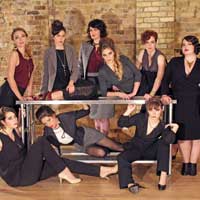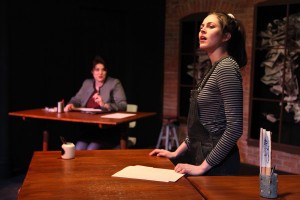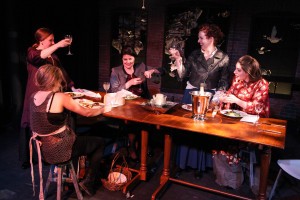
 [rating=4]Usually in a production, there is one actor who stands out. He or she may carry the show, be the strongest actor in a cast full of them, give a weaker performance than others actors or, sometimes, mar the whole experience. The Arc Theatre’s production of Caryl Churchill’s “Top Girls” is marked first and foremost by its absolute unity in the quality of the ten performances. Every single actress is superlative, and it is a delight to watch each one of them inhabit and execute their roles.
[rating=4]Usually in a production, there is one actor who stands out. He or she may carry the show, be the strongest actor in a cast full of them, give a weaker performance than others actors or, sometimes, mar the whole experience. The Arc Theatre’s production of Caryl Churchill’s “Top Girls” is marked first and foremost by its absolute unity in the quality of the ten performances. Every single actress is superlative, and it is a delight to watch each one of them inhabit and execute their roles.
As the play begins, after a rather bizarre music (Sound: Matt Reich) and dance (Dustyn Martincich) by the actresses before the show began which was markedly out place, the character Marlene has a dream in which the cleric’s daughter and Scottish proto-travel writer Isabella Bird (Meg Elliott); the Japanese Courtier, emperor’s mistress, and mendicant Buddhist nun Nijo (Lana Smither); and the famous or infamous (depending on one’s perspective) but almost certainly apocryphal Pope Joan (Pamela Mae Davis) enjoy dinner and conversation. Joining them are the avowedly fictional Duel Gret (Kelsey Phillips), the subject of a painting by Brueghel that portrays her doing battle in hell and Patient Griselda (Kate Marie Smith), one of “The Canterbury’s Tales” less formidable women. Together they discuss their biographies, particularly their relationships to fathers and husbands, their religious orientations, careers, and what it means to them to have lost children to death, to have them snatched away at birth, or in some cases, never to have had them at all.
Nothing I write can do justice to the depth, strength, and nuance with which each of these actresses tackles her role, but I would be remiss if I didn’t try even briefly: Meg Elliot is a fascinating mix of the stately, worldly, and feminine as Isabella; Pamela Mae Davis is highly charismatic, and a fiercely intelligent and learned as Pope Joan (albeit erudite and abstract—almost a caricature of the scholastics); Kelsey Phillips embodies a crusading warrior spirit as Dull Gret; and Kate Marie Smith has a genteel and refined loveliness as Patient Griselda even if it is more Regency than Medieval. Likewise, the costumes were extremely convincing (Catharine Young) and no doubt, to paraphrase Olivier, “the wigs helped the actresses do the work.” 
In the second act, we learn Marlene’s story. She runs an employment agency for women in London, has fully embraced Thatcher’s laissez faire capitalism, and seems absolutely oblivious to what the barely latent content of her dream might be trying to convey, despite the fact that her clients and employees closely resemble the women from her dream so much that they are played by the same actresses. It becomes clear by the end of play which culminates in an intense and highly satisfying final scene, that she has abandoned significant familial obligations with grave consequence for his sister Joyce (Natalie Seele who gives a performance important as shrewd and competent as her all-capable character) and adoring niece: Angie (portrayed by Aislinn Kerchaert who is the perfect mix of slow, immature, almost supernaturally prescient, and disturbed teenager). Her friend younger friend Kit (Tyle Meredith) further darkens the narrative by producing the eeriness that always results in adults playing children with great skill and believability.
Churchill’s wonderful use of sharp dialogue is on full display here. It may not be exactly lyrical, but her characters have a facility with, and the dialogue always manages to be simultaneously highly fluent, realistic and humorous helping to produce, and consequent a extremely compelling and fast-paced narrative. Likewise, she builds high dramatic tension in the two inter-woven narratives in the second act even though the audience expects the characters secrets before their revelation.
That said, the dinner party shows a certain lack of ability to capture female subjectivity by ignoring how real women coped in intelligent and resourceful ways with the challenge of living in times and places where formal, and often informal, power structures were dominated almost exclusively by men. Instead, they respond with passive acceptance to what begins to feel like a heavy-handed litany of patriarchal abuses, especially by the time we get to Patient Griselda who leaves us longing for the Wife of Bath. This undermines our ability to identify with characters that should be sympathetic because we are outraged by these abuses, and watch in disbelief as they accept them with complete passivity. Similarly, Churchill never seems to make progress in resolving the question she sets out to explore: what it means to lose one’s children, to leave one’s family to pursue professional success, and to abandon one’s nurturing qualities to embrace ruthless ambition and laissez capitalism, perhaps if her play had room to admit that to a certain extent these are human questions as much as they are women’s issues, she might have made more progress, but as it is, it feels a little like the play fails to produce an argument out of the material it sets out to explore.
Sophisticated lighting (Jason Heitt) and a flexible set (Cailin Short) brought a hyper-surreal feeling to the first act, which made it feel very mage like a dream, and a realistic feel to the the second, convincing us that we were in a bright London office or gritty flat outside Ipswhich. Great attention was clearly played to nailing various dialects (David Schlumpf) which helped bring remote figures from history and literature alive in the first half of the play, and convincingly created the sense of working class and professional England Circa 1980 in the second half.
The show is running at the Den Theatre located at 1333 N. Milwaukee Avenue. Performances are Thursday through Saturday at 7:30 pm and Sundays at 6 pm. Regular Tickets are 20 Dollars. Group discounts are available by emailing teddy@arctheatrechicgo.org Tickets are available at www.arcthteatrechicago.org. The show contains occasional, very course language, and mature themes.
To see what others are saying, visit www.theatreinchicago.com, go to review round-up and click at “Top Girls”
\






More Stories
“Elvis Presley Was a Black Man Named Joe” reviewed by Julia W. Rath
“Guys and Dolls”
“Dummy in Diaspora”